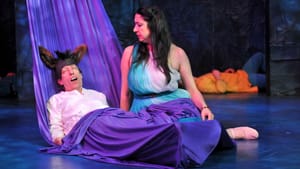Stay in the Loop
BSR publishes on a weekly schedule, with an email newsletter every Wednesday and Thursday morning. There’s no paywall, and subscribing is always free.
The Bard, Philly-style
Philadelphia Shakespeare Theatre's 2014-2015 season

When I stopped in my local convenience store one evening, I saw a woman holding a helium balloon. She looked too old for that kind of a birthday party, and I didn’t see any children. Then I remembered.
“Midsummer Night’s Dream,” I said.
Her face broke into a big smile. “Wasn’t that wonderful?”
She was carrying the balloon because she had just seen the Philadelphia Shakespeare Theatre’s production of Shakespeare’s most popular fantasy. The production ends with a party, and the actors hand their balloons to members of the audience when they take their bows. I kept mine for more than two weeks, as I conducted scientific observations of its progress from ceiling hugger to shrunken rug rat.
BSR’s theater reviewers covered several Shakespeare plays during the 2014-15 season, but they overlooked the Philadelphia Shakespeare Theatre. I took in two of the company’s plays, as an ordinary patron, and I think their oversight was a grievous omission. The little theater space on the top floor of the First Unitarian Church is making a major contribution to Philadelphia's theater season.
The virtue of energetic choreography
The Midsummer Night’s Dream production possessed a number of virtues, including well-designed sets and engaging acting, but its most striking quality was its energetic choreography. The actors were in constant motion, embellishing every line with tussles and other bits of business. Carmen Khan’s direction matched the grace and wit of Shakespeare’s words with actions that highlighted the romp implicit in the language. I usually find Shakespeare’s low comedy episodes tedious. In this production, they were genuinely funny.
There’s a natural tendency to slip into a pseudo-British “Shakespearean” diction when performing Shakespeare. Khan’s actors spoke in the day-to-day accents we hear all around us. Outlanders may even have felt some of them spoke pure Philadelphian. They did this so naturally that I didn’t think about it until the play was over. In the best Shakespearean productions, the actors create the illusion that poetry is the natural language of humankind. The contemporary accents supported this illusion — and they’re just as valid as attempts at upper-class English. Scholars seem to agree that Shakespeare’s contemporaries sounded more like the characters in Justified than the aristocrats in Downton Abbey.
A fresh view of over-familiar material
The company’s Henry V took an inventive tack. Director Aaron Cromie staged it as a student reading in a prep school classroom. The teacher took the role of Shakespeare’s narrator, and the students played all the other parts. Posts on the chalkboard indicated the scene changes.
For me, the production provided a fresh view of over-familiar material. The play’s best known aria, the St. Crispin’s Day speech, is usually presented as a rousing declamation to the troops. Akeem Davis played it as an urgent, buttonholing appeal to the four lords gathered around him. His conversational approach added an intimate intensity to the words and elicited a well-deserved “Bravo” from someone in the audience.
Not realistic, but fun
Henry V is, to a large extent, a paean to high enterprise and youthful ambition. The students at an upper-class high school made appropriate stand-ins for Shakespeare’s adventurous young prince and his entourage. For the battle scenes, the prep school students donned bits of athletic gear and went at each other with hockey sticks and golf clubs, sh outing and feinting like real kids letting off steam in mock battles. It wasn’t very realistic, but it was fun. Besides, nobody has ever claimed Shakespeare is a trustworthy guide to the details of military history.
outing and feinting like real kids letting off steam in mock battles. It wasn’t very realistic, but it was fun. Besides, nobody has ever claimed Shakespeare is a trustworthy guide to the details of military history.
In Henry V, the battle of Agincourt is presented as a series of generic hand-to-hand encounters, like most of the battles in Shakespeare’s plays. The English win, in Shakespeare’s version of history, because they’re steadfast warriors led by a dashing young monarch. The script never mentions the English archers who slaughtered the French knights with clouds of arrows.
In the last few years I’ve seen several of the Shakespeare Theatre’s productions, including Romeo and Juliet, Henry IV, and The Winter’s Tale. The Philadelphia Shakespeare Theatre is the only local company exclusively devoted to Shakespeare, and it consistently produces lively, well-executed treatments of its chosen repertoire.
What, When, Where
A Midsummer Night’s Dream, by William Shakespeare. Carmen Khan directed. April 3-May 17, 2015. Henry V, by William Shakespeare. Aaron Cromie directed. October 22-November 16, 2014. Philadelphia Shakespeare Theatre, 2111 Sansom St., Philadelphia. 215-496-8001 or phillyshakespeare.org.
Sign up for our newsletter
All of the week's new articles, all in one place. Sign up for the free weekly BSR newsletters, and don't miss a conversation.
 Tom Purdom
Tom Purdom